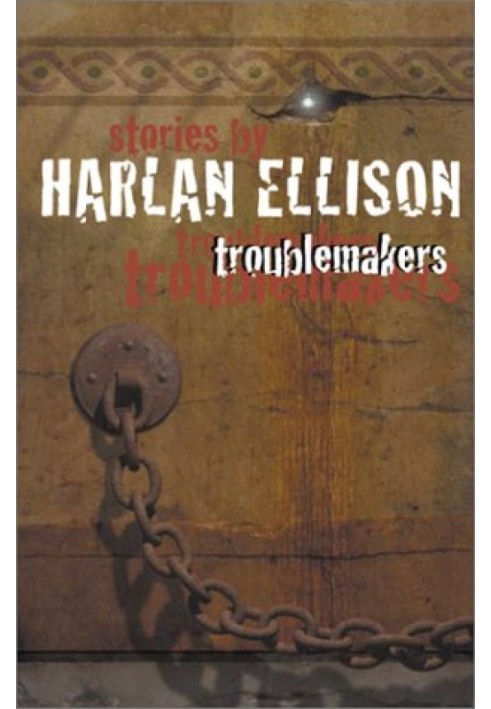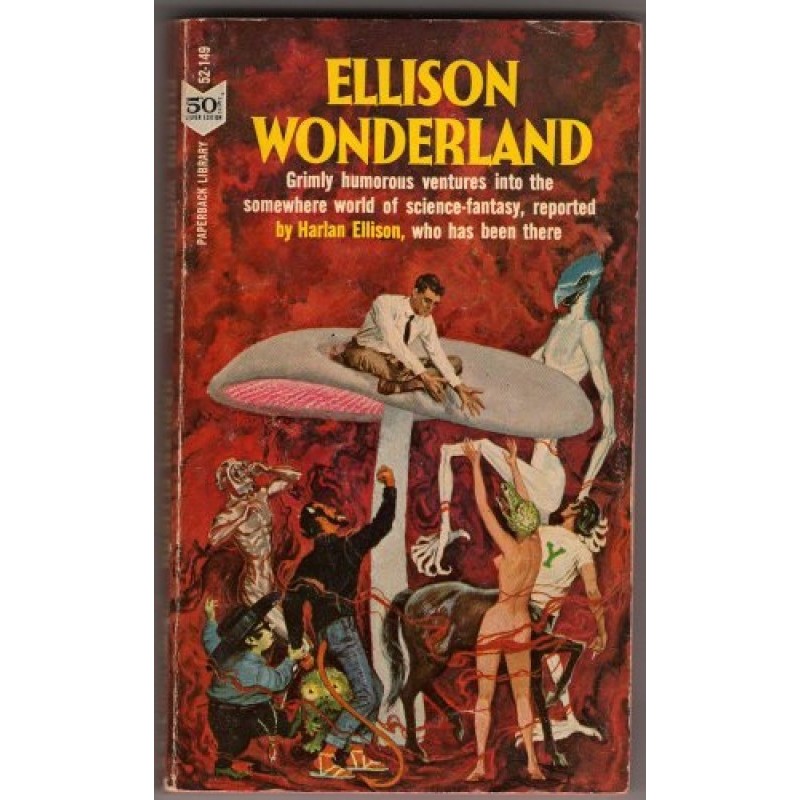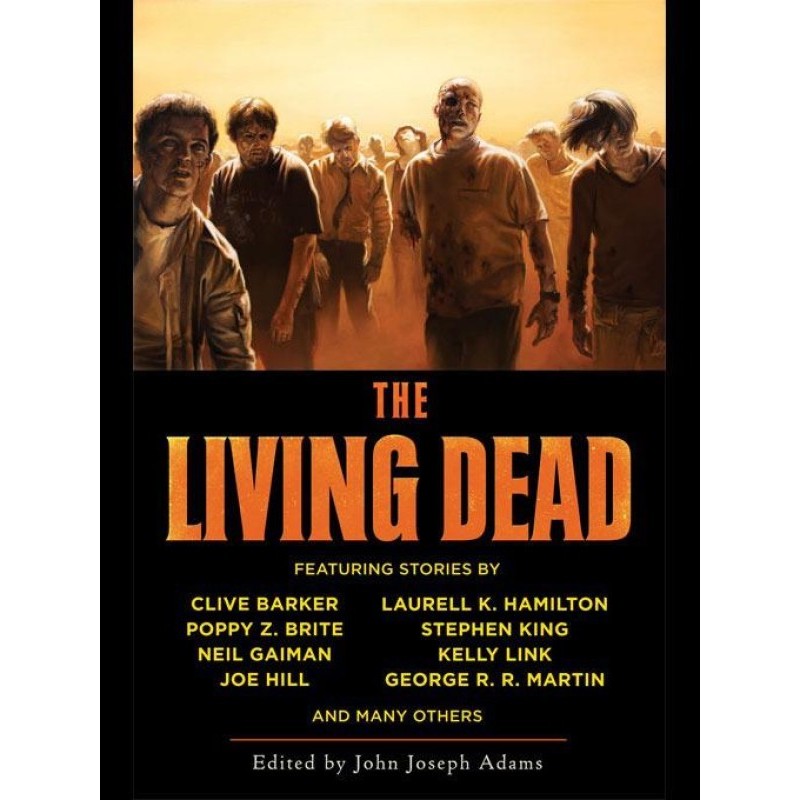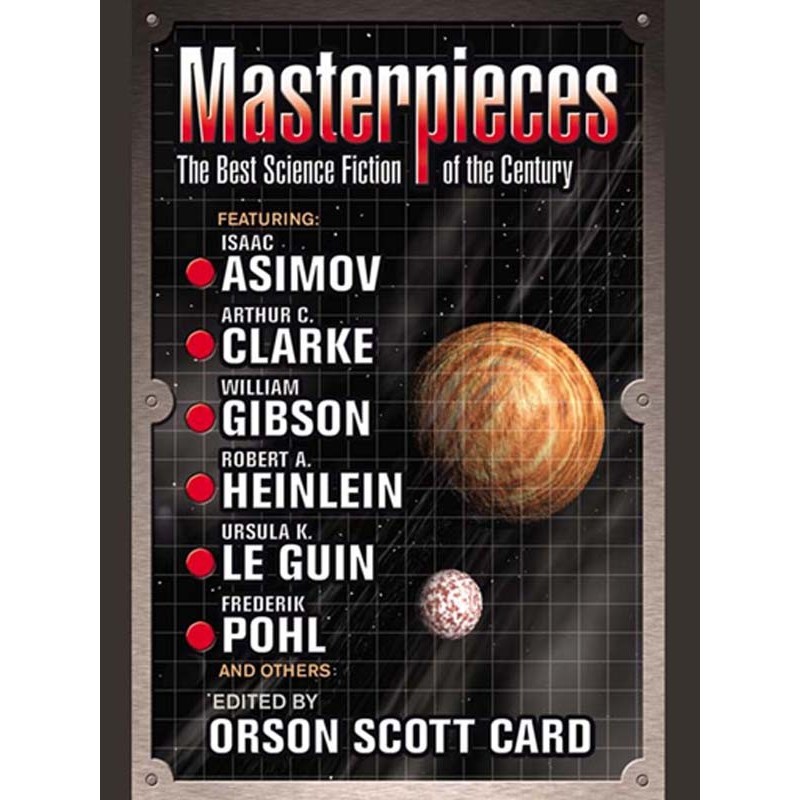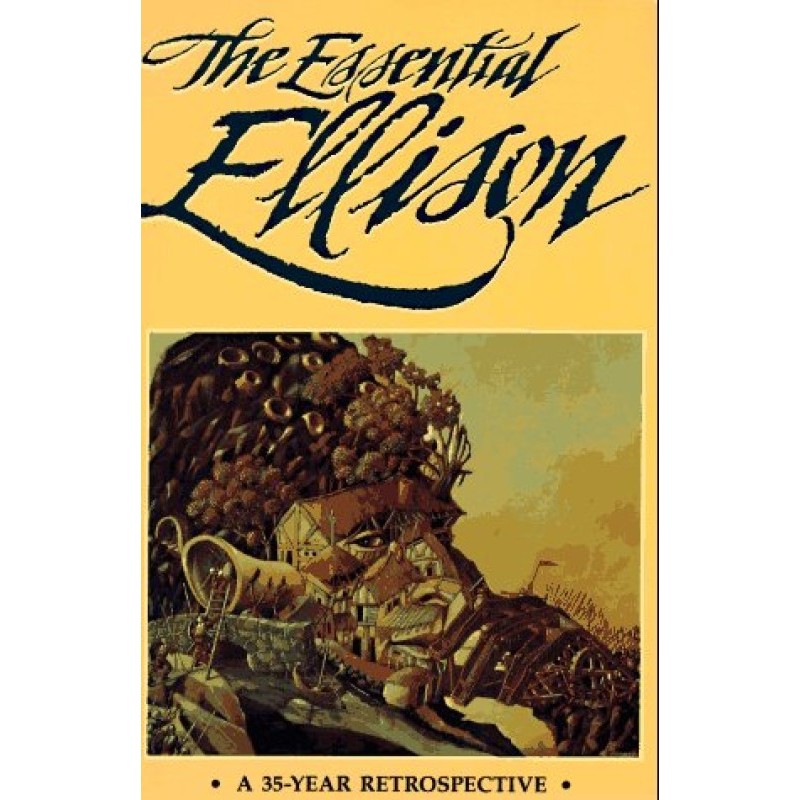Troublemakers
 Instant download
Instant download
after payment (24/7)
 Wide range of formats
Wide range of formats
(for all gadgets)
 Full book
Full book
(including for Apple and Android)
In a career spanning more than 50 years, Harlan Ellison has written or edited 75 books, more than 1700 stories, essays, articles and newspaper columns, two dozen teleplays, and a dozen movies.Now, for the first time anywhere, Troublemakers presents a collection of Ellison's classic stories—chosen by the author—that will introduce new readers to a writer described by the New York Times as having "the spellbinding quality of a great nonstop talker, with a cultural warehouse for a mind."
Here’s one of the few Secret Truths I’ve learned for certain, having been “on the road” since I was thirteen and ran away. (Had nothing to do with my folks; they didn’t beat me; I was a restless kid, wanted to see the world.) The Truth is this: most of the reasons we give for having done something or other, usually something that got us yelled at or grounded or busted, most of the reasons we dream up are horse-puckey. (I’d use the B-word, but libraries are going to be stocking this book.) All those reasons and excuses are just lame rationalizations, and they only tick off the people yelling at you. So shine ‘em on. Forget them. The only reason that makes any sense is “It seemed like a good idea at the time.” Lame though it may be, it’s the Truth. “Why did you bust that window?” It seemed like a good idea at the time. “Why did you get hung up on that guy/girl when you knew it was a destructive hookup?” It seemed like a good idea at the time. “Why did you do that lump of crack?” It seemed... well, you get it. Too bad the guy in this first story didn’t get it, because the True Answer to why you fell in love with someone who ranked & hurt you is...it seemed like...
I don’t know about you, but I hate it when the coming attractions trailers at the Cineplex give away the whole plot of the flick they want me to pay megabucks to see next week. Same for when they do it on television, or in a review of some book, and they print one of those idiot “spoiler warning” lines-as if we had the self-control to stop reading or watching. So I don’t want to give away the punchline of this next story, but I need to put in right here what the troublemaker “lesson” is. So let me be even more obscure than usual. Pay attention: not everything in life is what it seems to be. On the other hand, this psychologist named Sigmund Freud once said, “Sometimes a cigar is just a cigar,” meaning not everything is necessarily a symbol for something else, in this case a phallic symbol (you could look it up). We are usually afraid of, or suspicious of, that which we don’t understand; that which is unfamiliar. So before you start seeing enemies under the bed, and thinking somebody who dresses or looks or sounds different from you is a threat, remember the old story about the mouse (or squirrel, or frog, whichever version you heard) who is out on this road at midnight in the wintertime, and he’s freezing his mouse, squirrel or frog butt off, and along comes this big horse, and he sees the creature is turning blue and about to die (or in the case of the frog, to croak), and he drops a big, fat, steaming, smelly road muffin on him. It may be foul in there, but at least he’s warm, and his life is saved. Until a fox comes along, sees him all nice and toasty, his head sticking out, and fox takes a bite and yanks out the itty-bitty critter, and eats him. The moral being: not everybody who dumps you in the sh-t is an enemy; not everybody who pulls you out of the sh-t is a friend. Sometimes things are simpler than they seem. Sometimes all you’re afraid of is your own ignorance.
If this next story seems a bit familiar, it’s only because an ego-drenched movie director ripped it off when I adapted it in 1965 for a segment of The Outer Limits. So I brought a lawsuit against the film company. If you perceive a striking similarity here to a movie called The Terminator, well, go rent a VHS or DVD and watch at the end, when they roll the credits, to see something interesting. So this story has two good troublemaker lessons to be learned. The first one is so obvious I’m embarrassed even to be laying it on you: violence becomes a way of life. If you think a punch in the mouth really solves any problems, pretty soon that’s the only way you can handle a problem, big or small. And finally, one day, you take a swing and someone puts out your lights for keeps. Smart is better than strong. Clever is better than clocking someone. Outthink the problem, don’t let it bench-press you into making it your problem. The other lesson is the one the Academy award-winning director should have learned (and maybe he hasn’t even learned it yet): don’t let your ego get so hungry that it leads you to act unethically because you think you’re such Hot Stuff and nobody can touch you. Don’t think the rest of the world is as stupid as you’d like it to be: somebody is always watching. Sunny Jim, know this: there is always a faster gun out there; and there are some people whom you just cannot scare, no matter how big and loud you come on.
I had this pal when I was about fifteen or so, I’ll call him Dandy, even though that wasn’t his name. He’s still around, and I see no reason to disrespect him, but I want to use him as the example of the troublemaker lesson embodied in the story that follows...an admittedly silly little story I wrote early in my career. Dandy was talented. He was whip-smart, and good-looking and could talk to girls and adults with ease. He was the front-man for our bunch of weird geekazoids, because he got along with the basketball team and the social slicks and the cops, even. But he was one of us, because he liked to read, and he had a talent for writing, and he understood science and math and all like that, sort of an all-around Renaissance High School kid. So we all thought he was going to be the one who became famous and rich and had the best-looking girls. (Remember, I was the one who was gonna wind up in the gutter or jail.) And soon after we all graduated high school, Dandy wrote this story that got published in one of the most prestigious magazines of the time, he got a book contract, he got a full scholarship to an atomic energy university, and he was courted and inducted into a top-line fraternity. And the book never got published, he bombed out of school, he drank too much, and he wound up writing copy for some mail order catalogue. Spent a decade or so wandering around, and last time I heard of him he’d managed to find a happy berth, and was enjoying life. But now he’s approaching seventy, and there was a lot of potential and grandeur that never got to show itself. He procrastinated. He put off till a decade later, that which he should’ve done today. Rain, rain, go away, come again...
The lesson in this “space opera” should be apparent. If you’re hired to do a job, DO THE DAMNED JOB! There are always punk-out reasons you can dream up why: “I’m not being paid enough” or “They work me too hard” or “How come s/he over there is doing the same job as I am, but s/he’s getting paid twice as much” or “They don’t respect me.” You’re supposed to enjoy the work you do, but if circumstances put you in the grease at a Mickey D’s, or under a leaking tranny on somebody’s Yugo, or working the stockroom at a K-Mart or Target, and you have to do it for the dough, and you hate the job, and you hate the hours, and you hate the fact that you can’t be out hanging with the posse, well tough sh-t, Joker; you signed on to do the job, and they pay you to do it, so DO THE DAMNED JOB! If you don’t like the gig, quit. Give ‘em notice promptly, don’t leave ‘em in the lurch suddenly, don’t trash the area out of baby-spite, and don’t start shoplifting. Just DO THE DAMN JOB! That’s how somebody with strength does it. Don’t whine, don’t piss’n’moan, don’t jerk ‘em around, just hang in there as long as it’s ethically necessary, and then get in the wind. But if you sign on to do the job, no matter how onerous the chore, DO THE DAMNED JOB, just do it.
Trying to inject a subtextual “moral” into a story as brief as this one puts me in mind of a great quotation by the author of Moby Dick, Mr. Herman Melville. He once said: “No great and enduring volume can ever be written on the flea, though many there be who have tried it.” (And even though the wonderful Don Marquis did a whole book about a cockroach named archy, and his swinging friend, the slut cat Mehitabel, a cockroach is certainly higher on the evolutionary scale than a flea, so what that tells us, hey, I don’t have all the answers.) But though I’m writing this “troublemaker lesson” where it ain’t necessary, because this short-short story is essentially the product of a smartass who never grew up, it does, in fact, suggest a lesson you deadbeats ought to heed. Which is this: if all you’ve got to back up your wisecracks and stupid jokes-the kind you make in the movie audience that gets everyone cheesed-off at you-is more smartmouth, you are very quickly going to look to everyone around you, everyone you want to be impressed by you, as what you truly are: a horse’s patoot.
Since I was in trouble from the git-go (hell, I was taken to the Principal’s Office on my first day in kindergarten; not ten minutes after my mother let go of my hand and left me in that classroom full of babies and sandboxes) (I’ll tell you that tale another time, but I suspect Miss Whatever Her Name Was, the kindergarten teacher at Lathrop Grade School in 1939 or ‘40, whatever it was, in Painesville, Ohio, I’ll bet she still has the marks of my fangs in her right hand), I knew early on that I would have to pretend to be one of the crowd, as best I could fake it, or get the crap kicked out of me at recess and after-school every day. Well, like Alf Gunnderson in this next story, I managed to hide my true personality a little...but not very well, and not for very long times at a stretch. Folks, believe me on this one: if you are what we call a “green monkey,” the other apes are going to rip you a new one every time they smell you. Hiding out is an art. But don’t hide yourself so well that others like you can’t find you. And don’t follow the crowd so much that eventually you’re not playing at it. Don’t wind up doing it so well that the mask you’ve worn to perfection becomes your real face. Protect yourself, but don’t get assimilated. And never wage a land war in Asia. I just thought I’d throw that in. You never know.
So I’m watching the report on CNN about how little kids who’ve become enamoured of smackdown wrestling (which is so fulla crap bogus I can never figure how anybody can be dumb enough even to watch it, much less think of it as anything but staged stupidity, Three Stooges in ugly tights...but then I can also never understand why people who watch those weepy televangelists don’t spot them as the con men they truly are), and the kids are so impressionable...not to mention dumb as a paving stone...that they’re setting up these makeshift WWF play areas in their backyards. And they’re jumping on each other, and they’re hitting each other with chairs, and they’re throwing smaller kids against walls, and they’re dropping both knees into some other urchin’s solar plexus, and in general going way beyond the kind of silly horseplay you and I engaged in when we were their age. (And here’s a question: isn’t there an adult in that time zone who can see what’s going down, and maybe suggest that poking a garden hoe into another kid’s eye might impair his career as an air traffic controller in later life?) But the chilling capper to this report is the moment when one of these doofus children, who has been-are you ready for this-videotaping the massacre, isn’t satisfied with the “reality” of the scenario, and he takes a flippin’ cheese grater to the face of his “opponent,” slicing and dicing the kid for life, and he looks into the camera and grins and says, “See, now ya kin see the blood! Ain’t it kewl!” The troublemaker lesson to be learned from this story is: curiosity about things that you shouldn’t be curious about can get you scarred for life. Oh, and the other lesson: stay away from people dumber than you. If such creatures exist.
The lesson here is pretty much like the lesson in the previous story, except it’s stated differently. So don’t give me a hard time; sometimes I have to write a piece of philosophy half a dozen different ways, just till my weary brain gets the message. Let us not forget that I was getting into trouble even worse than yours, years before you came out of yo momma, squealin’ an’ pukin’, which makes me dumber than you, earlier than you. And it takes me a while to catch on. But one thing I know for certain: when I go to what my wife charmingly refers to as a “face-sucking alien” movie, and some actor we’ve come to like a lot ventures off by himself, or herself, into that dark room or down those basement stairs or, the way Harry Dean Stanton got offed in Alien, wandering into the storage bay with the water dripping down those clanking ceiling chains, and we just know the acid-drooling alien is out there somewhere, and he’s just wandering around like a doofus in a Pauly Shore flick...well, I don’t know about you, but I’m shouting at the top of my lungs in the theater, GET THE HELL OUTTA THERE!!! And even if he hadn’t read the script, he should know from the creepy music and the pro forma pre-butchery scare of a cat jumping out of nowhere that within two beats there’s going to be a blade at his throat, a fang at his ear, a power mower going for his wazoo. It’s a convention of scarey movies. So I got this idea for a story, in which the protagonist (I won’t call him a hero, because he’s a creep) is aware of this time-weathered convention, and will not, absolutely will not go into the equivalent of “the dark room.” Wherein lies the lesson to be learned here. Curiosity kills blah blah blah. More than that, though, the lesson is: what you do is gonna catch up with you, kid, no matter how far or fast your run, what you have done will always circle around behind you, get ahead of you, and power mow you in the wazoo.
Okay. So not everyone who puts you into the sh-t is an enemy; and not everyone who pulls you out of the sh-t is a friend. So, okay; you got that. Now let me give you the troublemaker lesson that has made me the Golden Icon you see before you. The point of the story you’re about to read is that even when they tell you “it can’t be fixed, you got to buy a new one, a more expensive one, the latest model,” they are jacking you around. Even when they tell you “it can’t be done, it’s never been done, nobody’s ever done it that way,” all they’re revealing about themselves is that they are limited, minimally-talented, inept, lazy to the point where they’ll let the job walk out the door then have to stretch their imagination to figure out a way the job can be done, and they are not people you should be dealing with, because they can’t solve their own problems, much less yours. The world is full of dullards. Sad, sorry little ribbon clerks who fear taking responsibility for their own lives, so how the hell can you expect them to be brave or smart enough to take on a problem that emanates from your life? They cannot pull you out of the sh-t. They can only put you further into it. They just aren’t very smart. The lesson here is the same lesson you find in all Art, whether book or story or movie or oil painting or classical symphony or great sculpture. (I cannot suggest that hip-hop or rap contain this message, because they’re too illiterate or loud or just bad street doggerel, but that’s my hang-up, so give it a pass, because I don’t suggest you should agree with me, or even like me, because I’m too smart to give a damn if you think I’m kewl or not, ‘cause we already got your money for this book.) What it is that all Art says is this: PAY ATTENTION. That’s it. Nothing more profound or hard to understand. Pay attention. And if you do, just like the guy in this story, you will discover that there are many ways to solve a problem that most other, timid ribbon clerks will never pull down. The lesson of this story-and this book entire-is that you can never know enough, you can never be too smart, and you need to figure out the way the world works without believing that every rule you’ve been told is immutable-it can’t be done, no one’s ever done it, etcetera-just because some limited potatobrain believes it. The world is yours, go get it.
Wrote this one a couple of times, made it better each time I went after it. Then turned it into a TV segment on Tales from the Darkside. You may have seen it. Kareem Abdul-Jabbar played the Djinn. (Don’t lose your day-job Kareem.) And the lesson passim this little tale is a good one for those of you who, like me, lead lives determinedly singular and oftimes cutting trail with trouble. The lesson is the same one Nelson Algren included in his famous three rules for living, as they were codified in a terrific novel called The Man With the Golden Arm. He said, “Never eat at a diner called “Mom’s,’ never play cards with a guy named ‘Doc,’ and never get involved with a woman who’s got bigger troubles than you.” (It was a “guy” novel, so if you’re feeling foolishly Politically Correct, which is a pain in the patoot, you can substitute “never get involved with a “guy” for “woman.”) If you learn nothing else from me in the course of reading this little tome, kiddies, let it be this: bad companions can drag your snout down into the mud faster than dope or drink or deep religious\ fervor. The world is full of leaners. People who are bone-stick-stone stupid, but they’ve got a low ratlike cunning. They know how to side you and smooth you and get into your pocket, and then give you ‘tude about how you be hare-assing them when you call them and demand they repay you. They will involve you in idiot schemes, they will waste your time and your energy, they will mooch off you and eventually abandon you, step off when someone starts making static. They are the “bad companions” your momma and poppa warned you about. They are the yamps and shermheads, the biscuits and trife bums who will kill your waking hours and give you night fright when you lie down. The lesson is this: make your own way. Set your own pace. Do not get drawn into some non-productive Jay-up that will sap your strength and let the air out of your dreams. In this story, a pretty nice guy and a pretty nice woman, who probably shouldn’t have rolled on a duo, find themselves paying the price for each other’s bad company. Yeah, sure, it’s got a happy ending, but this is a story, gee, it’s a piece of fiction! It ain’t real.
Got to be careful about codifying the “lesson” in this one, because it is, in some ways, a statement about the way I live my life, and if you follow the trail too closely, you’ll get into more trouble than you deserve, which is the opposite of what this book is supposed to do...according to my publisher, who says this book is intended to make you better citizens and happier individuals, with an understanding that if you litter your Taco Bell and Burger King garbage in the streets I will seek you out no matter where you live, and I will nail your head to a coffee table. At least that’s what my publisher tells me this book is supposed to do. But I haven’t lied to you yet, not as far as I can tell; and I’m not about to start now. As if I gave a-Well, the point of the lesson in this story-which I’m told, by academics who teach it in literally hundreds of college English and Modern American Writing classes, is one of the most reprinted stories in the English Language-have you noticed, it’s only my charming humility that has held me back from true stardom-the lesson is that if they suck you into the System, extricating yourself may be damned near impossible. Letting your life be set to other people’s schedules may satisfy their needs, but you’ll be trading off bits and pieces of your own life to placate others who do not, in actuality, care much about you or your problems or desires or potentialities. They mumble “I know how tough it is for you” or “I understand” but when it comes right down to it, it is their production schedule or swing shift time or actuarial table that mesmerizes them. Their hearts bleed that you’re lying on an operating table having your stomach replaced with a vacuum cleaner or a bidet or somedamnthing, but that pulmonary drip-drip-drip only masks their annoyance that, like the mule you are, you’ve fallen to your knees under the yoke of their schedule. Yes, as I told you before, DO THE DAMN JOB, just do it; nonetheless, Life keeps getting in the way of Being On Time, and once in a great while you just have to say screwit! And bear this in mind, folks: if you work at their pace for twenty-seven years, do 1,444 jobs well, and do them to the deadline, if you ain’t got the juice and you mess up on the l,445th gig, you will catch the same amount of flak and the same amount of guilt and the same amount of badmouth and opprobrium you would snag if you’d been late every time. The lesson here is one that will get you clobbered if you follow it. Run your life at your own pace, not that of the Man.
Ah, yes, Grasshopper, the secret message here is a sly one. As Tuanmu Tz’u said, “We can be taught the external trappings of the Master; we cannot be taught the spirit of his words or his genius.” That’s according to Confucius. Mmmm. To be absolutely flat wit’chu, I got nothing here. Running on fumes. That is word up. Because there really isn’t anything deep or meaningful in this story from which I can draw Some penetrating insight. And maybe that is the lesson where there is no lesson, Grasshopper. Maybe the lesson for a troublemaker is to know when to can the crap, shut the mouth, stop trying to fake the funk and just fess, there is no great revealment in this little story. The lesson is what the artist Mark Rothko said: “Silence is So accurate.”
The lesson in this one is ridiculously obvious: be careful what you wish for...you might get it. Now that seems pretty slick when you first hear it, but at some point you’ve got to ask yourself, “Exactly what the hell does that mean?” What I’m saying, if you wished for it, what’s the downside? Well, from a lifetime of seeking after treasures and riches of all kinds and ages, most of which weren’t worth the hasssle, I am here to tell you incipient troublemakers that there are goodies we all are told to want, that are made of poison ivy and mist and tooth-rot when you get up next to them. Here’s one I’ll just run past you at a clip: my third wife. See, here’s how it was. It was during the year or so when I went through my “Hollywood phase.” I was writing movies and TV, and I was the hot writer wallowing in my fifteen minutes of fame, and one night I’m shooting pool at an exclusive Beverly Hills club called The Daisy with Leo Durocher and Peter Falk and Omar Sharif-well, you ought to know at least one of those-and I see this absolutely knockout looking female come into the place on the arm of an assistant director I had met once or twice, and I took one look, and it was like Michael Corleone in The Godfather...I got struck by the thunderbolt. So I says to Peter, I says, “I’m going to marry her,” and about a month or two later I did. I wished for that goodie, who in this instance was a human being (of sorts), and I got what I wished for. It was a marriage that lasted 45 days. Worst 45 days of my life, I think. With the exception of my two years in the Army, or Ranger basic training at Fort Benning, or this damned lawsuit against internet piracy against AOL and RemarQ, but those are different horror stories, for some other time. It was forty-five days of duplicity, mendacity, infidelity, violence. (I bought her a huge metal hairbrush, she spent a lot of time brushing her hair, and this thing must have weighed seven pounds, like that, and one night she blindsided me as we were getting ready to go out to dinner, and whacked me across the temple with it, a solid roundhouse wallop, and she opened me clean to the bone; and then she freaked out at the sight of blood spurting allover the bedroom, and ran shrieking into the guest bathroom where she tried to hide in the tub; and I crawled in, oozing red everywhere, and told her it was okay, not to worry about it, and she ran off into the night to see some other dude, and I collapsed and only came to when Huck Barkin came by to see me, and got me to the emergency ward where they took I don’t know, something like thirty stitches on the left side of my skull.) Be very careful what you wish for, wannabe troublemaker, because Bad Trouble sometimes comes in very attractive, wish-inducing packages.
Well, we’re nearing the end of our time together. Has this cheery little package of fantasies made you a better person? Are you kinder to little old ladies and people in wheelchairs?. Do you have respect for the environment and now crave a better class of music? Are your armpits kissing sweet, and has your flatulence abated? Listen up: in the history of the written word there are maybe only a hundred or so books that can truly be called “important.” That is to say, they changed peoples’ minds and habits, brought light and intelligence into otherwise dark and ignorant existences. The Analects of Confucius; Plato’s The Republic; the Summa Theologiae of Thomas Aquinas; Don Quixote by Miguel de Cervantes; Pascal, Descartes, Spinoza; Thoreau, Darwin, Hegel and Kant. Uncle Tom’s Cabin and Nineteen Eight-Four. Maybe a hundred and fifty, tops. You won’t find thinking as significant as any of that in here. Mostly, these stories were written to entertain, to tell a tale and get a quick reaction. If there are life lessons to be learned, that wisdom can only be unearthed in stories like these by the sharp tool of your imagination. Take this next space adventure. It’s a hunt-and-seek action psychodrama about a guy so consumed with the need for revenge that he forgets the admonition in Shakespeare’s line, “heat not a furnace for your foe so hot that thee burn thyself.” So what this story says, I suppose, is that when the fire in your gut overpowers the rational coolness in your brain, you are primed to slip on that slippery slope of action/reaction without consideration of consequences. Blind and stupid, we slip and slide through most of our lives. It seemed like a good idea at the time. But only the thickest brick among you doesn’t already know that lesson. If there is magic in this-or any-book, it can only be conjured by wit and intelligence. When you are a creature of raw emotion, behaving on the moment like a dead frog-leg with a live wire in it, you must, I tell you honestly you must inevitably become somebody’s tool, somebody’s fool. Only by keeping alert-remember all Art has but one message: PAY ATTENTION-can you hope to be the one dong the tracking, rather than winding up being the fool tool who has been tracked and finally trapped. That’s as close to genuine wisdom as I get, this late in the day.
This next story, and the one after that are very dear to me. I suppose because there is just a whole lot of me in each of them. They come out of my own life, the last one straight out of my first big run-in with the law (and we’ll get to that in due measure), and this one because it stars the me who was once five and has never really outgrown that age, in some very major ways. I’m not going to get all dopey and chickflick about it, but I have a soft spot in my heart for Jeffty (with two “f”s, kindly note) because he’s such a sweet kid, and he embodies all my memories of the books and radio programs and movies and comics I loved as a kid. The secret lesson in this story, however, is a different matter. When I wrote this story the ending seemed very clear to me, seemed so obvious I never figured anyone would be confused by it. But damned if every college course that teaches this story wound up with the students and the prof arguing over what happens to Jeffty in the end. And if I tell you, if I explain it to you, well, that would be delivering the punchline before you hear the set-up. So, I can’t tell you what life lesson for troublemakers lies in wait for you at the end of this sad and maybe-a-little-complex tale about how the Present always eats up the Past and leaves you adrift. You cannot know, at your age, what it is like to not be able to run that fast, jump that high, hit a note that pure, work all night and boogie all day (or boogie all night and work all day). At your age you can only see the surface of someone my age, and try not to think about what it must be like to see the night coming on faster than you’d care to think about. Look: this story says some troubling stuff about how fast our world moves, how unfairly it treats innocence, and about what people sometimes have to do in the name of kindness. I am aching to explain the ending of this story to you, but I’m trapped, like a magician who cannot reveal the trick. Just remember this, because you’re probably too young to know about one giveaway telltale clue. It used to be, up until circuit breakers in the electrical panels of modern homes, that when a short occurred, all the lights in the house would flicker and dim for a moment. When they strapped a guy into the electric chair of some penitentiary, and they threw the switch on him, and the juice went through him, the lights would flicker and dim allover the joint. You can stick that in the back of your head and you’ll catch it when it comes up in the denouement. The other clue is this: pay attention to the palest creatures in this story, Jeffty’s mother and father, who are decent people. More than that, if I keep babbling, well, I’ll just be cheating you. And that I am forbidden by the Storyteller’s Creed to do.
Here’s where we part company. You’ve been extremely patient with me, and I know you understand that I’ve been a little loose and twitchy from the start, directing this at people your age for the first time. So I am in your debt, and I thank you. So by way of a proper gracious “bread ‘n’ butter” gift for your indulgence, I’m going to leave you with this last story. The thing of it is, there were only supposed to be 15 stories in this book, ending with what may be one of my best ones, “Jeffty is Five.” But after I sent the book in to my editor and publisher, I thought about it, and I knew I had to add “Free With This BOX!” to the collection because, well, it’s as close to a recounting of what trouble I’ve been in all my life as I have handy. Oh, hell, I’ve written whole books of essays and columns and commentaries and reviews, many of which include anecdotes about my weird span; but in this story, which I wrote a long time ago, I took something that had actually happened to me, when I was a little kid, and I only fictionalized it a little bit. It is a story, yeah, not a memoir, but it is clear and clarion me-speaking-to-you warning about what it means to live the kind of life I’ve lived, amazing and fulfilling as it has been. There is a line I remember from the journalist and madman Hunter S. Thompson, in which he speaks about “the dead end loneliness of a man who makes his own rules.” I recall it now, as I get ready to bid you fond farewell, because if there is a lesson above all others contained in this volume, it is this: be your own person. Be kind, be ethical, be honorable and courageous; respect your friends, keep your word, treat your enemies with honor if you can but spin ‘em if they won’t let you treat them that way; don’t believe the okeydoke that people who’re trying to sell you something lay on you, remember True Love only happens when you have no fear and can laugh about it, and you cannot possibly be too smart. Above all, be your own person. Never blame bad luck, or fate, or “the breaks,” or paranoid delusions about conspiracies for what your life has become. You are now, and you will always be, in charge of your destiny. What was that line out of Buckaroo Bonzai...oh yeah, I remember...”Never forget: no matter where you go, there you are.” Here I am, the product of what I’ve made of myself, in trouble from the git-go; and there you are, looking at me looking at you. Wherever you are, kid, remember, I’m there, too. Take care of yourself. Don’t step on no broken glass.
Data sheet
- Name of the Author
- Харлан Эллисон
- Language
- Ukrainian
- Release date
- 2001

